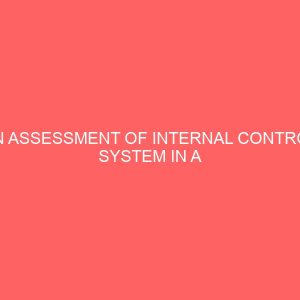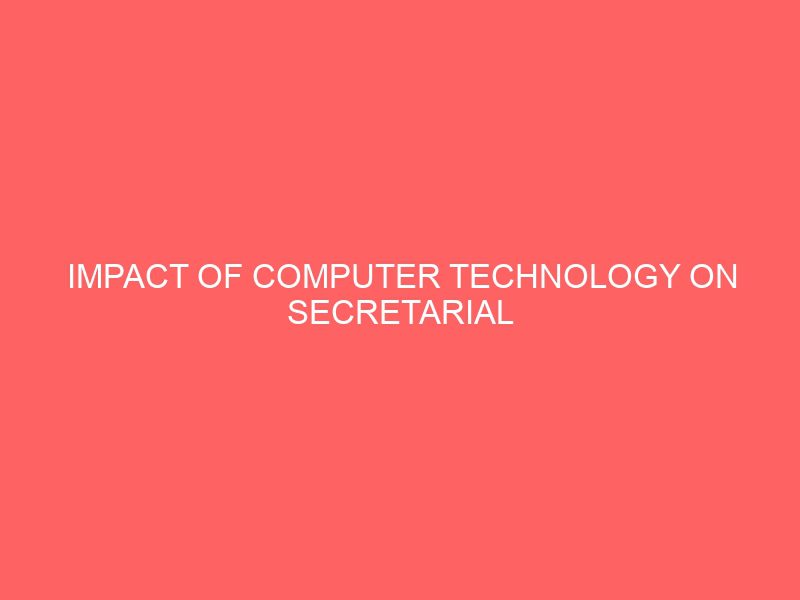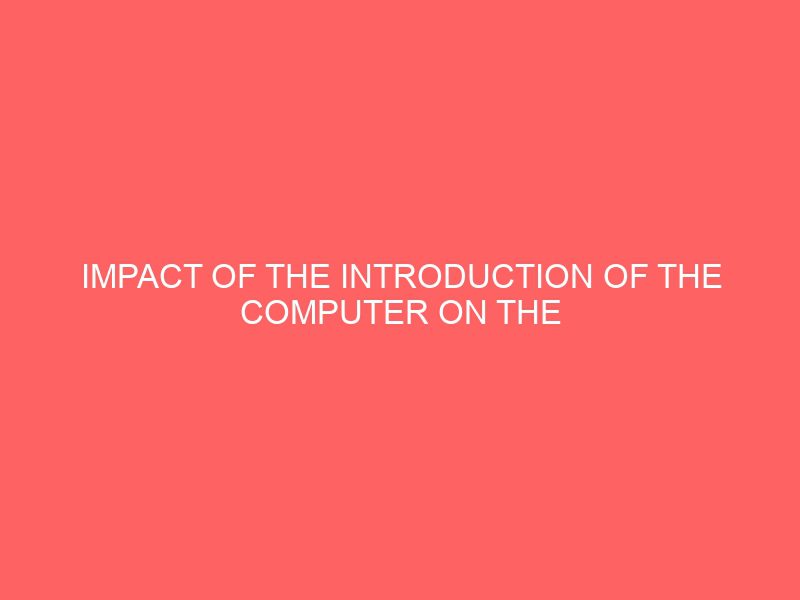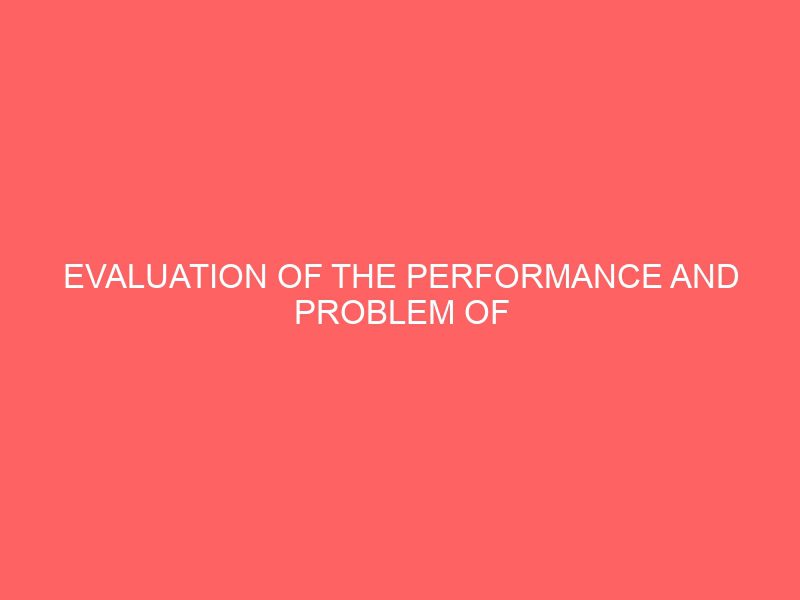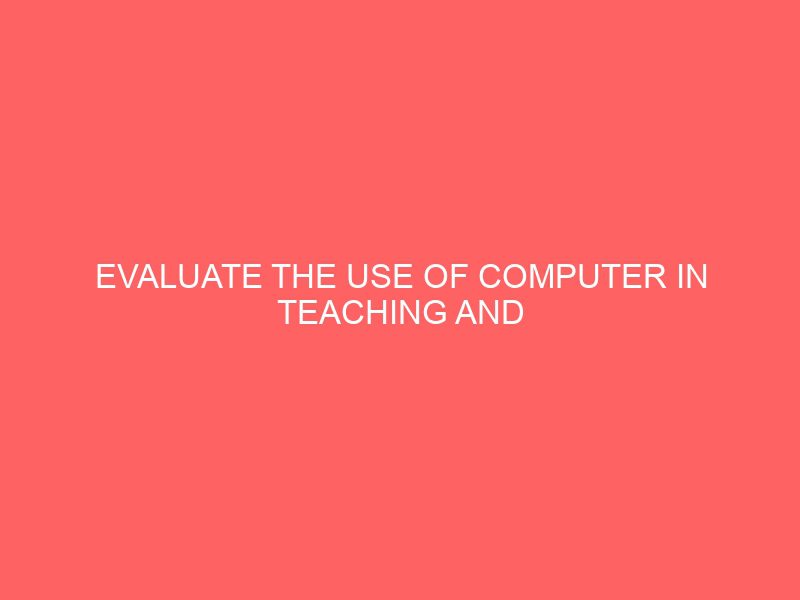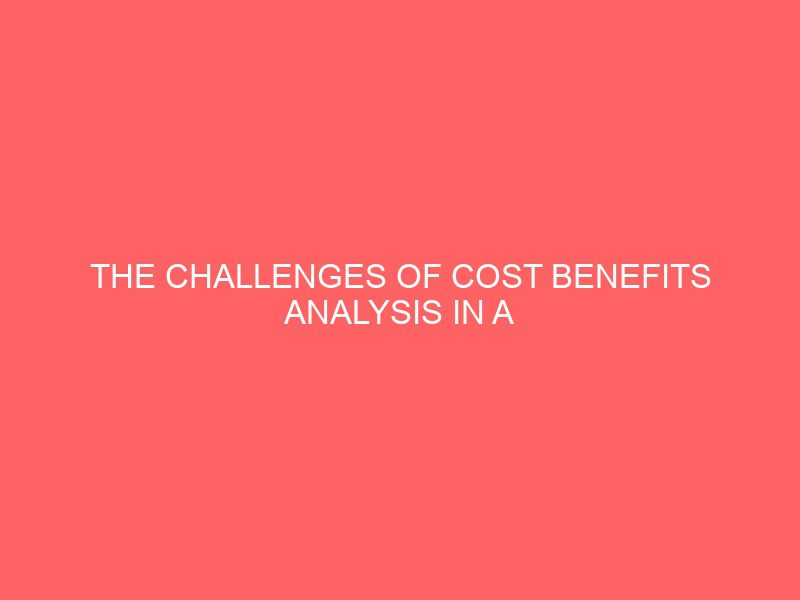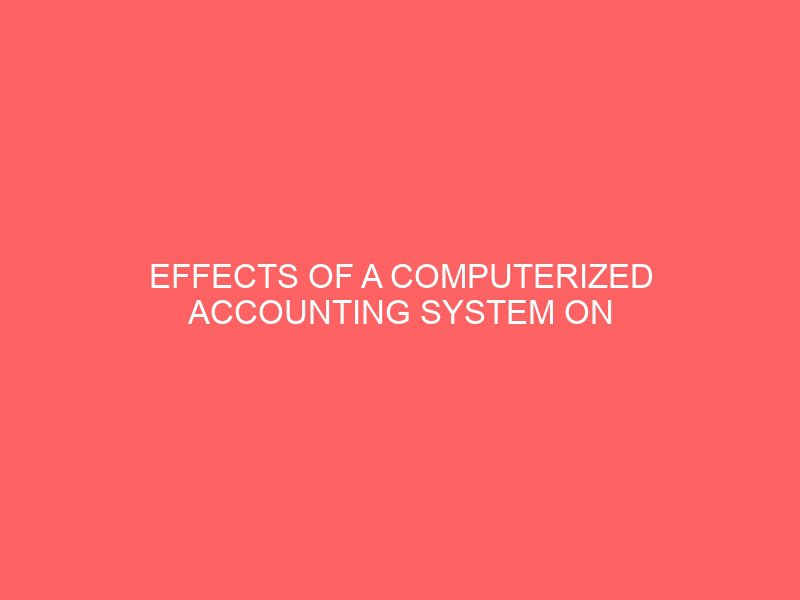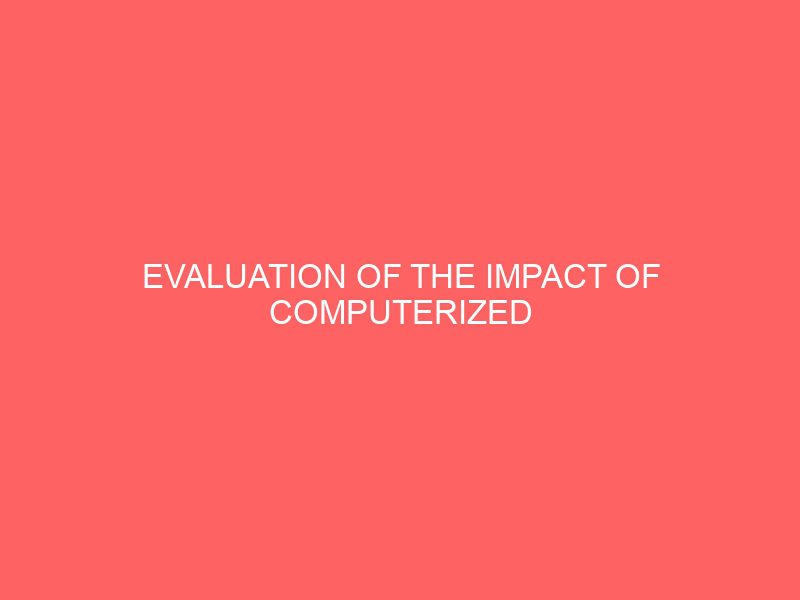IMPACT OF THE INTRODUCTION OF THE COMPUTER ON THE SECRETARIAL PROFESSION
THE IMPACT OF THE INTRODUCTION OF THE COMPUTER ON THE SECRETARIAL PROFESSION
ABSTRACT
The degree to which computer is used in offices has been of serious concern to secretarial profession. This study investigated the impact of the introduction of the computer on the secretarial profession and how the secretarial react to the introduction of computer.
In order to arrive at a conclusive decision on the above objective, the researcher carried out a library research, interviews and questionnaires.
The populations of this study consisted of hundred secretaries in some selected banking institutions namely; First Bank of Nigeria Plc, Okpara Avenue, Union Bank of Nigeria Plc, Uwani and Abakpa Nike Community Banking Limited. Questionnaire and Oral interview were used to collect data.
The statistical tools used are average and percentage. When the data was analyzed, it was found that secretaries do not react adversely to the introduction of computer in their offices, computer have created new skills for the secretary and have added some spices to their work. With the acquisition of such skills, secretaries are now seen as indispensable tool in the office, thus giving them good professional status. And it was recommended that secretaries should develop attitudes and learning skills that would enable them to take advantage of new opportunity.
TABLE OF CONTENTS
CHAPTER ONE
Introduction
Background of the study
1.1 Statement of problem
1.2 Purpose of the Study
1.3 Research Questions
1.4 Significance of the study
1.5 Delimitation of the study
1.6 Definition of terms
CHAPTER TWO
Literature review
2.1 Perspective on Computer
2.2 Computer and organizational output/productivity
2.3 Computer and workload
2.4 Computer and workers health
2.5 Computer and redundancy
2.6 Synthesis of literature
CHAPTER THREE
Research methodology
3.1 Area of Study
3.2 Research design
3.3 Population
3.4 Sample and sampling technique
3.5 Instrument for data collection
3.6 Method of gathering and Administering of data
3.7 Validation of research
3.8 Method of data analysis
CHAPTER FOUR
Data presentation
CHAPTER FIVE
Summary of findings, conclusion,
And recommendation
5.1 Summary of findings
5.2 Conclusion
5.3 Recommendations
5.4 Suggestion topics for further research
5.5 Limitation
Bibliography
Questionnaire
CHAPTER ONE
INTRODUCTION 1.1 BACKGROUND OF THE STUDY
Today, the business world is undergoing far-reaching
Technological revolution due to the advancement in science. For all types of organizations to succeed in today’s rapidly changing environment, they need to be able to be process data and information effectively.
In conducting them day to day operations organization use information for functions such as planning, controlling, directing, organizing and diction making. Information therefore is unique actionably a critical resources in the operations of all organization the business men, secretaries, students and in fact everybody, would now readily see the indelible impact of modern technology on people lives.
In an organization, information moves from person, forms are completed, filed and received and individuals communicate variety of both simple and complex concepts. At the turn of the century most written information were complied by hand in pen and ink copies were made by hand and communicated was by letter, telegraph or in person. Today most of the tedious functions related to information handling and processing are done through the computer.
For the secretaries, not only have their equipment changed, but also their administrative processes office routine management systems are similarly evolving into new forms. Computers have replaced manual typewriters and electric typewriter while for machines replaced telex machines. There are also different type of advanced communication gadget such as cellular phones, pager etc. With this radical change, the secretaries are expected to change and be able to keep up with all these professional changes around them. In accordance with the law of motion CHANGE is a constant phenomena. If we look at the beginning of man to the present day, we would see that there had been tremendous change. If there had not occurred, man would have remained primitive hill today. Change is a challenge and if we abide by change, it brings out the best in us thereby leading to erroneous progress.
The first office automatic machine were introduced 1930 and used paper rolls later paper tape as a form of memory. BY the 1960s the international business machine (IBM) had introduced the selective go If ball typewriter which allows the typist to change the print element, the go If – ball to provide a different type font (character design and sign) another break through was the introduction of IBM’s magnetic tape selective typewriter. This was followed by the introduction of a visual display unit (VDU) this allows the typist to see what I happening to the text as if being tyed amended and stored, but before it I being committed to paper or printed out. In fact, electronic systems are now possible that they can sense absorbs store, categorize ponder, very high quantity. Yet with greater accuracy, speed and reliability. Coventry, (1981) indicated that Recent development of the micro processor, founded on the silicon chips has potentials likely to have a vast social repercussion through out financial industry, for a simple chip take over a high proportion of today’s office job P.21. When we refer to computer system, we refer to information and communication system which are necessary for the functioning of the office. We assume that data processing and word-processing play a large role and also that human system under lie these technical systems. In an ideal situation therefore, the technology and the people function together harmoniously.
It is important to recognize that development and implementation of the computer is moving through several overlapping phases, each affecting differently.
In general, a distinction can be made between two classes of office workers. The first are the information worker they are those who are involved in the routine entry, recording, storage and transmission of information, those who fall under this group of worker include – Typist, secretaries, clerks and data entry personal.
The second group are the knowledge works-this group aconite of those worker who create, interpret, analyze and utilize this information these knowledge worker can be divided into two (2) groups professional/technical employees and managers.
The main impact of the computer is simply to facilitate office operation as they are now being carried out. For example the word professor replace the secretary’s type writers, the mini-computer replaces the clerk’s filing cabinets etc. More recently professionals and secretaries have begun using personal computers and sophisticated calculators to speed up their work. The timing of there development has largely been dictated by the emergence of the technology starting with the widespread introduction of word processor’s in the 1970’s, and it in the late 1970s and its legitimating as a business tool in 1981, with the introduction of the IBM P.C.
1.2 STATEMENT OF PROBLEM
Up to the 190’s the use of the computer in this country was limited to very few multinational companies. The secretary then had to contend with using manual and electric typewriters in performing her word processing function.
Furthermore storage and retrieval of information was by use of files, filing cabinets, index cards etc. Accessing of other information had to be through telephone directories and other relevant specialized text meant for such purpose.
Many of the secretaries of the 80’s are still in employment. With the advent and widespread use of the computer are then wonders how these secretaries are adjusting to be new devices now prevalent in modern offices are they finding it easy or difficult? Is the profession generally under threat by the introduction of the computer and the Internet? What can be done to keep the secretary still relevant in to day’s modern business setting? These and many more are what this research aims to find solutions for.
1.3 PURPOSE OF THE STUDY
The purpose of this study is to thoroughly investigate on the impact of the introduction of the computer on the secretaries.
1. How secretaries react or the attitude of secretaries towards the introduction of computers.
2. To ascertain whether the introduction of computer has in any way improve the secretary’s work.
3. To ascertain whether the introduction of computer has made it easy or difficult to adjust (especially the secretaries of the bank under investigation).
4. To determine the problems encountered by secretaries in trying to adapt to changes in the nature of their work.
5. To find out whether or not secretaries are involved in the planning and introduction of computers.
1.4 RESEARCH QUESTIONS
The research provided answers to the following research questions;
1. How do secretaries react to the introduction of computer
2. What problems are encountered by secretaries in trying to adapt to changes in the nature of their work.
3. Are there orientation programmes in facilitating the adaptation to new changes of work
4. Are secretaries involved in the planning and introduction of computers.
1.5 SIGNIFICANCE OF THE STUDY
The investigation of the impact of the introduction of the computer on secretaries in some selected banks in Enugu Metropolis. Would give some insight in the performance of secretaries on the advert of computers.
Many of the major problems that organizations have faced in the past have been that they are in awe of technology, they failed to recognize the need to use technology as a competitive weapon against their rivals, they expected technology to be difficult to use and also the unwillingness to address the compelling human issues which has been the major cause of low productivity. This study will help secretaries to full understand how their career will change as a result of the introduction of computers in their offices.
From this study, banks will now recognize the need to use technology as a competitive weapon. Winning a competitive edge has become of fundamental importance within national and international Banking, institutions. The prime emphasis of activity now rests on providing an ever improving levels of services to existing clients and customers and winning new business through the sheer quality of service provided and the ingenuity of marketing activity. Ultimately, it is only through establishing a competitive advantage over rival institutions that an institution can hope to maximize profitability.
In Banking sector where establishing a competitive advantage has become so important, it is necessary for them to pay particular attention to the role which technology plays in offering them an opportunity to gain this advantage. The main function of technological deployment is to assist an institution to gain a competitive advantage.
Finally, this research work will be of significance to the society at large because if the computer is well utilized, productivity (efficiency and effectiveness) would be enhanced, there by leading to a higher standard of ling for the society.
1.6 DEFINITION OF TERMS
Bank: This means any private or pubic organization which derives the greater part of its revenue from handling, managing, or investing money either on its own behalf or on behalf of its customers.
Computer: A computer is a device capable of accepting information, applying prescribed processes to the information and supplying the result of these processes.
Secretary: An executive assistance who processes a mastery of office work and skills and demonstrates the ability to assume responsibility without direct supervision, who exercise initiative and judgments and who make decision within the scope of assigned authority. Also a person who deals with correspondence or arranges venues, date and time for meetings.
Sophisticated: Having or showing a lot of experience of the would and social situations.
Effective: Having the desired effect producing the intended result.
Efficiency: Able to work well and without wasting time or resources, competent. The ability to produce the required result without wasting time or resources.
Equipment: The things needed for a particular purpose.
Productivity: Efficiency, especially in industry, measured by comparing the amount produced with the time taken or the resources used to produce it.




